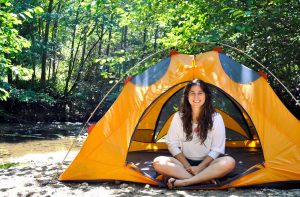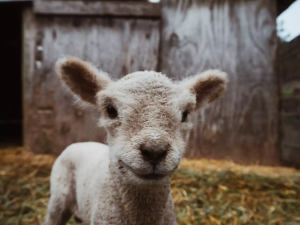Alyssa Ravasio: Rebel With a Clue
By Jennie Rose, guest blogger

For Alyssa Ravasio 2013 was a watershed year. It was the year she learned to code, built Hipcamp, and, at 26, took the helm as the site’s founder and CEO.
In this conversation with WEN, Ravasio talks of failing, blueberry picking, and her path from coder to CEO.
WEN: Can you describe your first pitch?
AR: I’ve been pitching crazy ideas and trying to get people to say “yes” to my pitches my entire life. When I was 9, I pitched my parents to let me borrow their brand new video camera so I could make a movie. I promised to buy them a villa in the south of France if my films went on to win Oscars. My mom still has that piece of paper and she totally plans to hold me to it. She says building successful companies is an equivalent.
In terms of pitching Hipcamp, some of my earliest pitches were actually kind of ambush style. I had learned how to code, and built the first version of the website. Any time there was a meetup event where there were people or free food, I would go and ask people if they liked to camp. If they said “yes,” I’d open up my laptop and start to pitch.
One of my very first welcomed pitches was pretty nerve wracking. I walked into a camping store in the Mission District called ALite. ALite makes beautiful gear and has a really good focus on keeping it simple. It’s a brand I admire. The founder came downstairs, this impossibly cool Alaskan man. After I showed him the website, he looked at me and said “We’ve been waiting for you. Camping has been way too hard to book for way too long, and we’ve been waiting for an app to come along and change that.”
WEN: How did you become a coder? Were you a STEM kid?
AR: I did want to be a scientist when I was a kid, but then I had a really bad teacher in high school and fell off the science and math train. I tried to learn how to code alone, and I did some in college, but I hadn’t really gotten anywhere.
Then I signed up for a 10-week coding course called Dev Bootcamp, and it gave me enough of a jump start to make progress. The course was so beautifully run. We practiced giving and receiving feedback. We had yoga every day. We learned how to recognize our superego talking down to us. It’s really good to learn programming with a community so you can all feel stupid together because when you’re learning how to code, you just feel stupid the whole time.
Once I graduated, I worked with a really great programing mentor, Liz Howard. When I got stuck on things, she was who I would go crying to.
WEN: What was the hardest point in the life of this company?
AR: It was our failure to partner with public land fast enough that led to the successful platform we have now. Let me explain what I mean by that: A company that was providing us with campground data decided to end their partnership with us. This was a punch to the stomach. We lost this key feature on campsite availability and it felt like the heart was ripped out of our product. We didn’t know how to move forward.
In the depths of despair we had to go back to our mission, which was to get more people outside. It occurred to me that if we worked with private landowners instead, we would have a useful product and solve the shortage of available campsites. We opened up the Hipcamp platform to allow thousands of landowners to open their property. This made it possible for many more people to get outside because there were more accessible places, with more amenities and easier camping. It’s an idea that is a hundred times bigger and better, but it took failing to get us there.
WEN: What is Hipcamp’s most important core value?
We have to leave no trace AND find a way to repair. Our number one most important company value is “leave it better.”
AR: So many of us in the outdoors culture have been raised with the motto “leave no trace.” I think that’s not good enough. We have to leave no trace AND find a way to repair. Our number one most important company value is “leave it better.”
This insight came from spending time with our hosts. Some of our hosts have inherited or bought land that was incredibly polluted. Now they use the Hipcamp revenue to remove trash and replant native species. For me this is the most exciting things about Hipcamp. We‘re supporting these people and making their philosophy more accessible to other people when they get outside.
We had our first ever Hipcamp Host summit a few weeks ago, and a host from Maine came with brilliant insight into how this community can better partner with the ecosystem restoration and regenerative agriculture movement to get more progress going in what I consider to be the greatest work of our time — repairing ecosystems. This summer she and I are going to camp together and pick blueberries on her blueberry farm. I’m also going to learn how to better support the regenerative ecosystem movement.
WEN: What’s your view on the climate crisis?
AR: I’m so tired of the environmental movement thinking that fear is going to get anything from anybody. Fear just makes people shut down. People are going to do things because of love, and fear will only make them paralyzed.
If you only look at the data it’s really depressing, and it’s really too easy to tune it out. We need to start changing our framing a bit. Instead of saying “Take a shorter shower or the oceans will rise,” we might say, “Hey, you have a chance to help repair this ecosystem by buying regeneratively grown vegetables,” or “By the way, this weekend if you can help restore a stream bed, this endangered salamander might make it. You can be part of how this salamander was saved.”
Let’s build a movement of people who are excited about restoring streams, protecting endangered species of birds and amphibians, and bringing salmon back. There are signs of people doing this everywhere, and we just need to amplify that.
Unique Hipcamps in and around the Bay Area:
Jug Handle Creek Farm (Caspar, CA) a nonprofit nature education center set on 39 acres, featuring the world’s largest Pygmy Forest Ecological Staircase.
Salmon Creek Ranch (Bodega, CA) 400 acres of rolling hills & redwood groves where campers can enjoy farm-fresh food and wildlife watching (including Scottish Highland cows and more than 20 species of wild birds). Funds generated from Hipcamp help support wildlife preservation.
Fortunate Farm (Caspar, CA) 40 acres on a historic, 100+ year-old organic farm whose mission is to feed people locally, sequester carbon, and empower their community. The farm is the first in the country to have a Carbon Farm Plan with the Mendocino Resource Conservation District.
Irish Creek Camp (El Dorado, CA) 60 acres on a historic ranch where campers can enjoy spectacular stargazing, hiking, and wildlife watching.
Windsor Family Farm (Sepastopol, CA) A small working farm where campers can enjoy farm-fresh breakfasts, horseback riding trails, and adorable farm animals such as Exhibit A below:

A member of WEN and the Bay Area chapter of the Climate Reality Project, Jennie’s writing has appeared in Independent Lens TV, Lateral Magazine, and The Daily Climate. She’s looking for glimpses into how the US economy will be impacted when the carbon bubble bursts. Jennie is looking for the next story. Please reach out if you have one that needs to be told at jenniezr@gmail.com.
